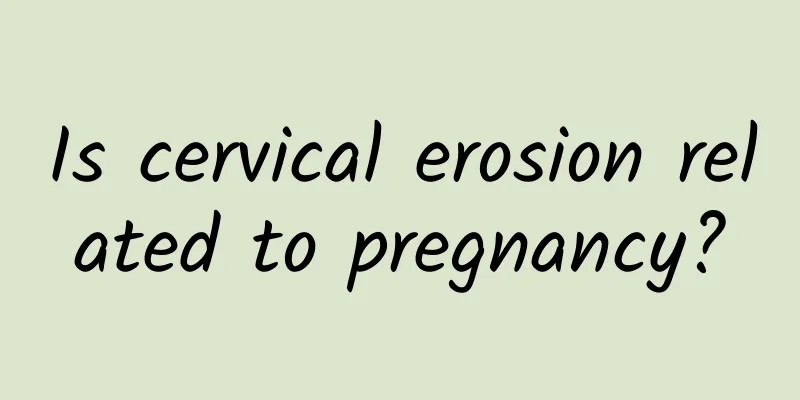Is cervical erosion related to pregnancy?

|
Cervical erosion usually does not directly affect pregnancy, but if the symptoms are severe or accompanied by infection, it may have a certain impact on women's fertility. In order to avoid potential risks, it is best to evaluate the health of the cervix before pregnancy and adjust and treat it in time. 1) Common causes of cervical erosion Cervical erosion is a change in the epithelial tissue of the female cervix, which is related to factors such as hormone level fluctuations, chronic inflammation, and repeated mechanical stimulation (such as childbirth or frequent artificial abortions). Mild cervical erosion is usually physiological, especially in young women and during pregnancy. Due to the increase in estrogen levels, the eversion of the cervical columnar epithelium will appear as erosion. Severe cervical erosion or accompanied by inflammation or multiple pathogens may cause increased and viscous secretions in the cervical canal, affecting the passage of sperm and thus hindering pregnancy. 2) How does cervical erosion affect pregnancy? (1) Inflammatory effects: In severe cases, cervical erosion is often accompanied by cervical inflammation, which may cause changes in the cervical secretion environment and interfere with sperm activity. (2) Spread of infection: Pathogens may be present in the secretions, causing the infection to spread to the uterus or fallopian tubes, inducing pelvic inflammatory disease and further impairing fertility. (3) Cervical injury: Severe erosion or cervical tissue damage due to improper treatment may affect conception or pregnancy stability. 3) Treatment and protective measures (1) Drug treatment: Patients with mild to moderate cervical erosion can choose local medication treatment, antibiotics such as metronidazole or antifungal drugs to treat infection and improve the cervical environment. (2) Physical therapy: If the condition is serious, it is recommended to choose physical therapy after doctor's evaluation. Common methods include laser, freezing or microwave therapy, which can repair the cervical epidermis and improve cervical health. (3) Healthy pregnancy preparation: Women planning to become pregnant should avoid premature cervical surgical intervention. At the same time, they should improve their body's immunity through a reasonable diet, folic acid supplementation, etc., maintain the balance of the vaginal microenvironment, and thus optimize pregnancy conditions. Generally speaking, mild cervical erosion is usually not necessary to worry too much, but severe erosion or repeated inflammation requires timely medical treatment. Women should pay attention to regular checkups during the pregnancy preparation period to ensure the health of the cervix, avoid potential risks, and increase the chance of pregnancy. Good long-term reproductive health management is important for both pregnancy and childbirth. |
>>: Should I do six-item estrogen test for amenorrhea?
Recommend
What are the dietary remedies for congenital absence of vagina?
Gynecological diseases are quite annoying for wom...
What to do if adenomyosis causes pain for half a month
In life, some patients with adenomyosis inevitabl...
We should pay more attention to the cause of chronic adnexitis
Chronic adnexitis is a common disease in our live...
When will uterine fibroids be removed? When will uterine fibroids be removed?
Under what circumstances will uterine fibroids be...
Experts introduce self-examination methods for uterine fibroids
In recent years, as more and more female friends ...
Patients with irregular menstruation should start dietary adjustment 1 week before menstruation
Irregular menstruation is a disease that many wom...
What are the hazards of cervical erosion in women? You should know the three major hazards of cervical erosion in women.
Cervical erosion is a very common gynecological d...
Three early symptoms of cervical erosion in women that cannot be ignored
As the incidence of female cervical erosion sympt...
Why do we need to do curettage for adenomyoma? How to treat adenomyoma?
Why do I need to do a curettage for adenomyoma? A...
The national weight loss star "cucumber", don't eat it with tomatoes?
Cucumbers are rich in nutritional value. They can...
What to eat to prevent uterine effusion
Uterine effusion is a common gynecological diseas...
What are the specific symptoms of early ovarian cysts?
What are the early symptoms of ovarian cysts? Ova...
What medicine should I take for uterine effusion?
What medicine is good for uterine effusion? Uteri...
What causes uterine fibroids in pregnant women? How should pregnant women treat uterine fibroids?
Uterine fibroids are a clinically high-incidence ...
Causes of vulvar leukoplakia as pointed out by traditional Chinese medicine
Vulvar leukoplakia is a gynecological disease, an...









